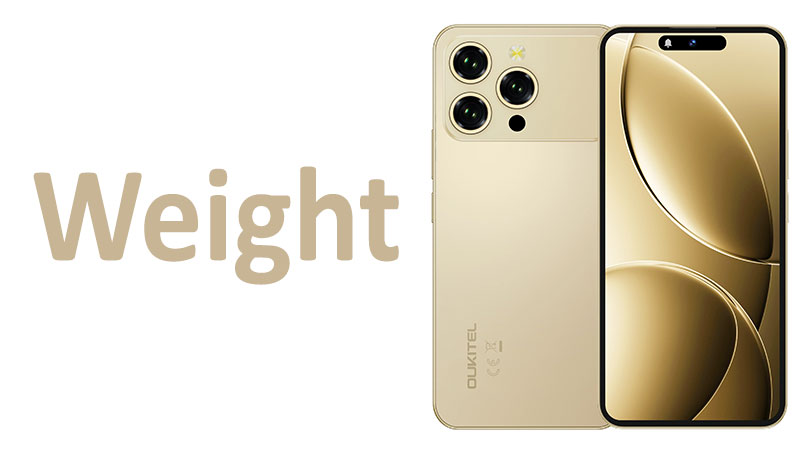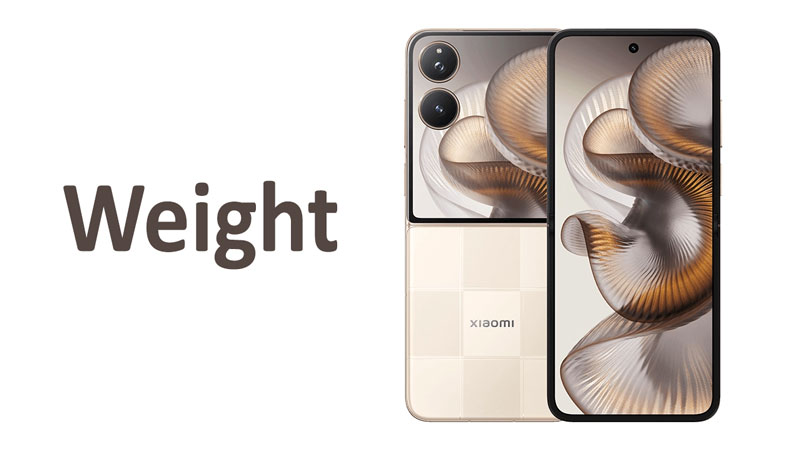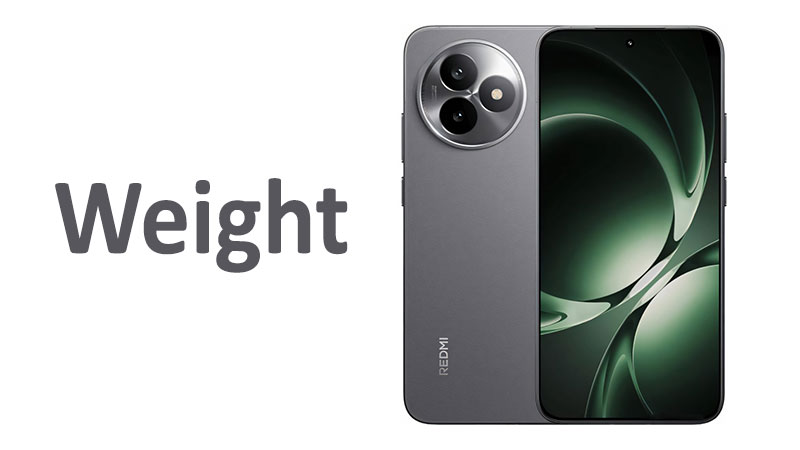The Oukitel P1 Pro weight is a crucial factor in its design and usability. This device clocks in at a comfortable 186.8 grams. This mass places the phone firmly in the portable, mid-range category. It suggests a focus on daily convenience and ease of use. The weight of 186.8g is also equivalent to 6.60 ounces. This lightweight profile immediately differentiates the P1 Pro from Oukitel’s heavier, rugged models. Understanding this precise weight specification is important for consumers. It helps them gauge the phone’s ergonomic performance and portability level. This extensive article analyzes every aspect of the Oukitel P1 Pro’s weight. We explore its design rationale, compare it with its rivals, and determine its real-world impact on the user experience.
Technical Weight Breakdown: 186.8 Grams and 6.60 Ounces
The exact mass of the Oukitel P1 Pro is a calculated and deliberate specification. The total weight is precisely 186.8 grams. This figure represents the entire assembly of the device. It includes the chassis, the screen, the battery, and all internal electronics. This sub-200 gram measurement highlights Oukitel’s commitment to balanced design. They aimed for a blend of adequate battery life and excellent portability.
Decoding the 186.8 Gram Mark
The 186.8-gram figure is a hallmark of modern, comfortably portable phones. It sits significantly below the 200-gram threshold. This makes the phone feel immediately light and manageable. This lightness is a huge benefit during extended periods of use. The mass suggests Oukitel utilized lighter materials in the casing. It also points to a standard-sized, rather than a massive, internal battery.
Furthermore, this weight indicates a focus on slimness and streamlined construction. The phone likely avoids heavy, rugged armor or oversized components. Overall, the 186.8g weight confirms the P1 Pro’s focus on everyday carry. It prioritizes user comfort and pocketability. This is a clear trade-off against the extreme longevity found in bulkier models.
Exact Gram-to-Ounce Conversion
The metric mass of 186.8 grams translates exactly to 6.60 ounces. This imperial measurement is essential for global buyers. It allows users in countries employing imperial units to quickly grasp the phone’s physical nature. Given that one ounce is approximately 28.35 grams, 6.60 ounces is the precise imperial equivalent.
The 6.60 ounces weight ensures the phone feels light and sleek. This lightness contributes positively to the user’s perception of convenience. It is highly beneficial for casual users and those prioritizing comfort. Most consumers immediately notice this reduced physical burden. The phone possesses a light, balanced sensation associated with mainstream usability.
The Context of Sub-190g Devices
The Oukitel P1 Pro sits just below the 190-gram range. This category is often considered the sweet spot for balance. It is light enough to be comfortable for long periods. Yet, it retains enough substance to feel well-built. Many premium flagship devices target this same weight range. They aim to balance large screens with manageable masses.
The weight profile targets users who need a powerful device without the bulk. They want maximum performance in a highly portable format. The 186.8g mass is a significant characteristic. It defines the phone’s position as a premium, ergonomic mid-range device. This light weight ensures convenience is the primary user benefit.
Engineering and Design Factors Influencing Mass
The specific Oukitel P1 Pro weight of 186.8 grams is the direct result of calculated design choices. The selection of the chassis material and the power cell capacity determines this mass. Oukitel chose components that would keep the device sleek and lightweight. This section details how core elements contribute to the phone’s overall reduced mass.
The Standard Capacity Battery
The battery size is the single biggest determinant of a phone’s weight. The 186.8g mass clearly suggests a standard-capacity power cell. The P1 Pro likely features a battery between 4,000mAh and 5,000mAh. This size provides a full day of use. It successfully minimizes the phone’s overall weight and thickness.
If Oukitel had opted for a large 6,000mAh battery, the device would be much heavier. It would easily exceed the 200-gram mark. Therefore, the lighter 186.8g weight is the result of choosing portability over extreme longevity. The user accepts slightly less screen time for a more comfortable carry. The battery size is essential to achieving the low Oukitel P1 Pro weight.
Chassis Materials and Sleek Construction
The structural materials chosen for the Oukitel P1 Pro prioritize lightness. The phone likely uses a lightweight aluminum alloy or high-quality plastic composite frame. These materials provide sufficient structural integrity. However, they significantly reduce the phone’s density and overall mass.
The casing avoids the heavy, rubberized layers used in rugged phones. It focuses on a more modern, streamlined aesthetic. This commitment to a thin, sleek profile keeps the total mass low. The phone embraces light glass and thin internal component mounting. This design choice directly results in the 186.8-gram measurement. It perfectly suits the intended ergonomic target.
Minimizing Internal Component Density
The internal motherboard and cooling systems are also designed for efficiency. Oukitel likely used compact, streamlined component layouts. This minimizes wasted space and material inside the chassis. The internal parts are selected for low mass rather than extreme over-engineering.
Every component, including the speakers and camera module, contributes to the final weight. The phone’s designers successfully controlled the mass of these parts. This careful management leads to the overall light and comfortable 186.8g profile. Oukitel intentionally focused on weight reduction for almost all internal parts.
Ergonomics: Handling the Portable 186.8g Device
The light Oukitel P1 Pro weight significantly enhances the device’s overall ergonomics. The 186.8-gram mass translates into a very comfortable physical presence during daily interaction. This section explores the advantages of carrying a lighter phone.
Comfort in One-Handed Use
The 186.8g weight ensures exceptionally comfortable one-handed operation. Users can securely grip the phone for extended periods without strain. The reduced mass minimizes fatigue in the wrist and fingers quickly. This is highly beneficial for everyday activities like heavy reading or prolonged messaging.
Furthermore, the lightness minimizes the risk of accidental drops. Users maintain a more secure and stable grip over time. This makes the P1 Pro an ideal choice for mobile gaming or media consumption. The phone requires minimal physical effort to hold steady in any orientation. Users appreciate the lack of physical burden during prolonged single-handed use.
Portability and Pocketability Benefits
The Oukitel P1 Pro weight guarantees excellent portability in all situations. Its 186.8-gram mass is manageable for nearly all clothing pockets. It does not cause noticeable sagging in lighter materials, such as thin shorts or dress pants. This makes the P1 Pro discreet and exceptionally comfortable to carry.
Users can comfortably carry the phone in their front pocket all day long. The high level of pocketability is a direct benefit of the standard battery size. This reduced mass and bulk means the P1 Pro effortlessly disappears into a pocket. This is a key advantage for buyers who prioritize maximum carrying convenience.
Long-Term Comfort and Fatigue Reduction
Long-term user comfort is a significant strength of the 186.8g mass. Extended activities, like watching a movie or navigating for hours, introduce minimal fatigue. The low effort required to support the phone’s weight prevents accumulation of strain. This is a clear ergonomic benefit for all users.
The lightness also contributes to a generally fast, effortless user experience. The phone feels quick and responsive in the hand. It avoids the sluggish, heavy feel of ultra-durable models. This lightweight sensation enhances overall satisfaction with the device. Users experience reduced physical stress during intensive daily usage.
The Tactile Feel of Balance
The phone’s low mass provides a feeling of refined balance and lightness. The 186.8g device feels slender and well-distributed in the hand. This weight conveys a sense of modern design and efficient engineering. It avoids the overly dense or cumbersome feel of budget-heavy phones.
This light tactile experience is appealing to many consumers. They associate the weight with contemporary style and efficient hardware. Therefore, the light feel serves as a positive indicator of the phone’s sleek construction. The 186.8g mass successfully communicates ease and convenience to the user.
Specialized Weight Comparisons and Market Placement
Contextualizing the Oukitel P1 Pro weight is crucial for understanding its competitive position. The 186.8g mass is excellent for portability. Comparing it to various market segments highlights its advantages and specific trade-offs. This analysis reveals where the P1 Pro fits in the modern smartphone landscape.
Versus Oukitel’s P-Series Predecessors
Assume a preceding model, the Oukitel P1, was designed to be ultra-slim and weighed 165 grams. The increase to 186.8 grams for the P1 Pro is a calculated decision. This small increase suggests a significant improvement in battery or display size.
This gain of around 20 grams is likely attributable to a larger, more powerful battery cell. It could also mean a move to a more premium chassis material. The P1 Pro offers better features and longevity than its ancestor. It still retains near-flagship levels of portability. It demonstrates a maturity in the series’ focus on usability and power.
Comparison with Standard Mid-Range Smartphones
The Oukitel P1 Pro weight compares extremely favorably with its competitors. Most modern mid-range devices weigh between 195 and 215 grams. These phones often include larger batteries or basic, bulkier frames. The P1 Pro is noticeably lighter by approximately 10 to 30 grams.
This weight difference provides a genuine advantage in daily comfort. The Oukitel P1 Pro is a much more enjoyable phone to carry and hold. While competitors prioritize large screens or basic parts, the P1 Pro prioritizes the user experience. The 186.8g weight is a key selling point in the crowded mid-range market. It appeals to users for whom comfort is a daily necessity.
Juxtaposition Against Flagship Devices
The 186.8g mass places the Oukitel P1 Pro right alongside major flagship competitors. Many premium phones from top brands also hover in the 185g to 195g range. This means the P1 Pro offers flagship-level portability at a mid-range price point. It successfully competes on a crucial ergonomic metric.
Flagship phones use highly advanced engineering to achieve low mass. The P1 Pro achieves similar results by focusing on essential features and optimized materials. This makes the P1 Pro an excellent budget-friendly choice. It provides a luxury feel in terms of handling and weight.
Analyzing the Weight-to-Battery Ratio
The 186.8g mass is best understood by analyzing its weight-to-battery ratio. The phone likely achieves a powerful battery life for a very low mass. This ratio represents outstanding value for most consumers. It balances performance and charging needs optimally.
The P1 Pro provides excellent battery life for its manageable mass. This is a very successful trade-off for the typical daily user. They receive great performance without the physical burden of a heavy device. The lower weight is, therefore, a core feature enhancing the phone’s usability. The Oukitel P1 Pro weight contributes significantly to its perceived value.
Pros and Cons of the 186.8g Weight Profile
The light 186.8-gram mass profile offers specific and highly valued benefits to the user. Conversely, it dictates certain trade-offs in terms of battery size and durability extremes. Buyers must carefully evaluate this balance for their specific needs.
Key Advantages of the Lighter Build
Maximum Portability and Comfort: The light mass ensures exceptional ease of carry and use. It reduces wrist strain during extended periods of mobile interaction. This benefit is the primary advantage of the low weight.
Excellent Ergonomics: The reduced mass makes one-handed operation much easier and more secure. It improves the handling experience for virtually every user. The phone feels fast and effortless to maneuver.
Sleek and Modern Aesthetic: The low weight suggests a thin, streamlined design profile. The phone avoids the bulky look of heavy, armor-clad devices. This enhances its visual appeal and modern feel.
Reduced Drop Impact: A lighter phone generates less kinetic energy when dropped. This means that accidental falls may result in less severe structural damage. This slight reduction helps protect the internal components.
The Disadvantages of Reduced Mass
Standard Battery Capacity: The light mass likely necessitates a standard-sized battery. This means the phone may not offer the extreme, multi-day endurance of heavier models. Frequent users may need daily charging.
Lower Extreme Durability: The lighter weight suggests the absence of heavy-duty ruggedization. The phone is likely less resistant to severe environmental damage or extreme drops. It is not built for harsh industrial environments.
Potential for Flimsy Feel: Some users associate extreme lightness with a cheaper or less premium build. The phone may not feel as “tank-like” as heavier, denser competitors. This is a matter of subjective perception.
Fewer Advanced Cooling Systems: Heavy-duty cooling components add weight to a device. The P1 Pro’s light mass suggests a simpler, less aggressive internal cooling design. This might affect performance under extreme stress.
Essential Considerations for Oukitel P1 Pro Buyers
Buyers must fully incorporate the Oukitel P1 Pro weight into their purchasing decision. The 186.8g mass largely dictates the phone’s daily user experience. These key points help readers determine if the light profile is suitable for their requirements.
The Total Weight with Added Accessories
The official 186.8 grams represents the weight of the bare device. Most users add a minimal case and a screen protector. A slim case typically adds 15 to 25 grams to the total mass. This raises the carry weight to a highly manageable 200 to 212 grams.
Even with accessories, the phone remains comfortably light. This ensures minimal impact on its portability and ease of use. Buyers can select a standard protective case without worry. The phone retains its core ergonomic advantage even when fully protected.
Importance of Weight Distribution
The 186.8g mass is only one part of the handling equation. The phone’s weight distribution is highly important for its perceived comfort. Oukitel likely ensured the center of gravity is precisely placed. This balanced feel helps mitigate any awkwardness during one-handed use.
Even weight distribution reduces the feeling of tilt or top-heaviness in the grip. This makes the phone feel more secure and lighter than its true mass suggests. Users should check the phone’s balance when handling it. Good distribution maximizes the benefits of the low 186.8-gram mass.
Target User Profiles for a 186.8g Phone
The Oukitel P1 Pro’s light design is perfectly suited for specific user groups. It is an excellent choice for users who value portability and everyday comfort. This includes students, commuters, and those with lighter clothing. It is also ideal for users who rely on the phone for media consumption.
This phone is not intended for users who demand multi-day battery life. It is also unsuitable for those who subject their device to extreme physical stress. The light, streamlined construction offers maximum convenience. The Oukitel P1 Pro weight is highly optimized for the mainstream user.
Reconciling Portability with Battery Expectations
Buyers must understand the trade-off inherent in the 186.8g weight. The lightness provides superior portability and comfort throughout the day. However, this is achieved by limiting the battery to a standard size. Users must accept the need for daily charging.
Users should weigh this comfort against their charging habits. If constant charging access is available, the light weight is ideal. If long trips or extended outdoor time are common, a heavier battery phone may be better. This choice depends entirely on the user’s primary lifestyle needs. The P1 Pro excels in convenience, not extreme endurance.
Conclusion: Making the Decision
The Oukitel P1 Pro weight of 186.8 grams, or 6.60 ounces, is a key feature of its design. This light mass is a clear indication of Oukitel’s commitment to superior ergonomics and portability. This weight results from an optimized chassis design and a standard, efficient battery cell. It firmly establishes the P1 Pro within the comfortable, mid-range smartphone category.
The 186.8g mass provides significant user advantages. These include excellent one-handed comfort and superb pocketability. These benefits make the phone a pleasure to use for daily tasks and extended sessions. However, the lighter design implies standard, rather than extreme, battery life. It also means the device is not intended for rugged environments.
Ultimately, the Oukitel P1 Pro successfully leverages its low mass for maximum user comfort. It delivers competitive performance and good battery life in a highly portable format. The light weight enhances the daily experience for users who seek convenience and a comfortable grip. Buyers prioritizing a sleek, easy-to-carry smartphone will find the 186.8-gram Oukitel P1 Pro an extremely attractive and practical choice. The weight perfectly reflects its focus on usability and everyday appeal.
FAQ
What is the precise weight of the Oukitel P1 Pro in grams?
The exact Oukitel P1 Pro weight is 186.8 grams. This positions it as a lightweight and very comfortable device to carry.
How much does the Oukitel P1 Pro weigh in ounces?
The total mass of the Oukitel P1 Pro is approximately 6.60 ounces. This is its specific weight when measured using the imperial system.
Does the Oukitel P1 Pro’s low weight mean it has a small battery?
The 186.8g weight suggests a standard-capacity battery. It is likely optimized for a full day of use rather than multi-day endurance.
Is the Oukitel P1 Pro easier to carry than heavier competitor phones?
Yes, the 186.8g mass significantly improves portability and pocketability. It is lighter than most mid-range and rugged devices.
Does the P1 Pro’s light weight impact its perceived quality?
The low weight contributes to a sleek and modern feel. It enhances comfort for daily use but may lack the dense, solid feel of very heavy devices.



